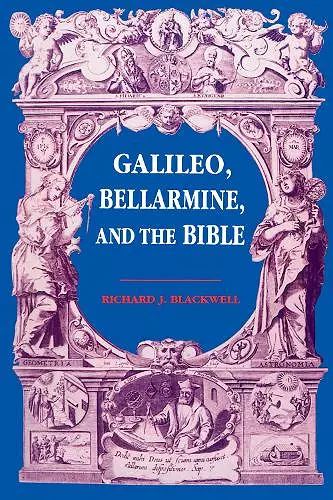Galileo, Bellarmine, and the Bible
Format:Hardback
Publisher:University of Notre Dame Press
Published:31st Jan '91
Currently unavailable, and unfortunately no date known when it will be back
This hardback is available in another edition too:
- Paperback£27.99was £27.99(9780268010270)

Considered the paradigm case of the troubled interaction between science and religion, the conflict between Galileo and the Church continues to generate new research and lively debate. Richard J. Blackwell offers a fresh approach to the Galileo case, using as his primary focus the biblical and ecclesiastical issues that were the battleground for the celebrated confrontation. Blackwell's research in the Vatican manuscript collection and the Jesuit archives in Rome enables him to re-create a vivid picture of the trends and counter-trends that influenced leading Catholic thinkers of the period: the conservative reaction to the Reformation, the role of authority in biblical exegesis and in guarding orthodoxy from the inroads of "unbridled spirits," and the position taken by Cardinal Bellarmine and the Jesuits in attempting to weigh the discoveries of the new science in the context of traditional philosophy and theology. A centerpiece of Blackwell's investigation is his careful reading of the brief treatise Letter on the Motion of the Earth by Paolo Antonio Foscarini, a Carmelite scholar, arguing for the compatibility of the Copernican system with the Bible. Blackwell appends the first modern translation into English of this important and neglected document, which was placed on the Index of Forbidden Books in 1616. Though there were differing and competing theories of biblical interpretation advocated in Galileo's time—the legacy of the Council of Trent, the views of Cardinal Bellarmine, the most influential churchman of his time, and, finally, the claims of authority and obedience that weakened the abillity of Jesuit scientists to support the new science—all contributed to the eventual condemnation of Galileo in 1633. Blackwell argues convincingly that the maintenance of ecclesiastical authority, not the scientific issues themselves, led to that tragic trial.
"Blackwell's book should be of interest to every theologian. He makes us further in his debt by appending a generous (nearly one-hundred-page) selection of documents pertinent to the debate as they impinge on the question of biblical truth and scientific observation." —Commonweal
"Much has been written about Galileo, and a considerable amount about Bellarmine, but no one recently has attempted a precise account of the encounters between them from the viewpoint of all the biblical, ecclesiastical, and scientific issues these involved. Blackwell has now filled this lacuna in exemplary fashion, providing an even-handed account that does full justice to the parties involved. The result is a work that not only illuminates an enigmatic episode in the history of the so-called 'warfare between science and religion' but also prompts reflection on similar episodes that surely lie ahead." —Catholic Historical Review
". . . [A] fresh, close reading of key texts." —Journal of Modern History
"A study of Galileo's confrontation with the church over the biblical assessment of heliocentrism from a theological perspective with special emphasis on the role played by the views at that time of the meaning, truth status, and authority of the Bible in the Galileo affair. The author argues that the maintenance of ecclesiastical authority, not the scientific issues themselves, led to Galileo's trial. Nine appendices give translations of relevant documents, writings, and correspondence of Galileo, Zuniga, Bellarmine, Foscarini and Dini." —Philosophy of Science
". . . Blackwell has shed new light on an old controversy. His scholarhip is impeccable, his insights sharp, his prose readable." —America
"Blackwell's book admirably succeeds in its objective, which is to present 'the intellectual ground occupied by serious Catholic thinkers who stood, as it were, on the other side of the fence from Galileo' during his conflict with the Inquisition. . . . Blackwell writes lucidly, provides a useful bibliography, and, best of all, translates many of the relevant documents, including Foscarini's treatise." —Choice
"An interesting and important book on science and faith interacting in the Galileo affair. [Blackwell] gives us many new insights and describes well the conflict about Copernicanism as viewed by two very important persons involved: Galileo, the observational astronomer who was also an amateur exegete, and Bellarmine, cardinal and inquisitor, who was also an amateur astronomer. This book will make fascinating reading for students of modern and ancient conflicts between religion and science." —Theological Studies
ISBN: 9780268010249
Dimensions: 229mm x 152mm x 18mm
Weight: 574g
304 pages